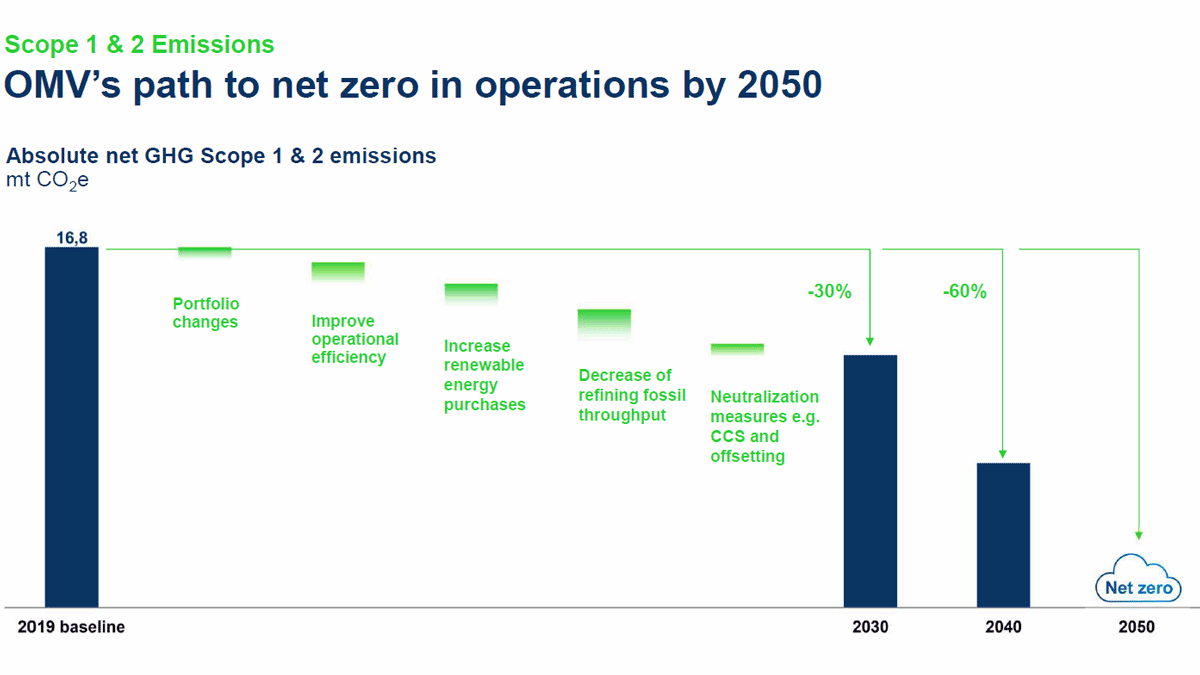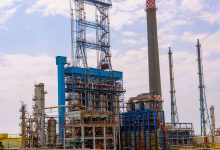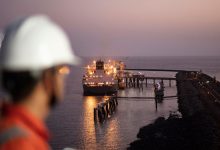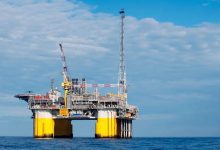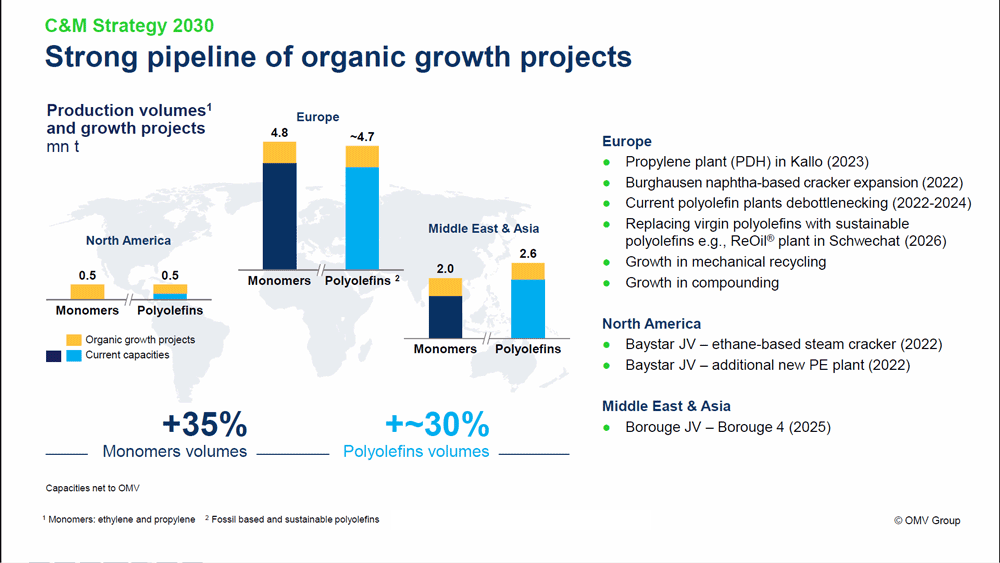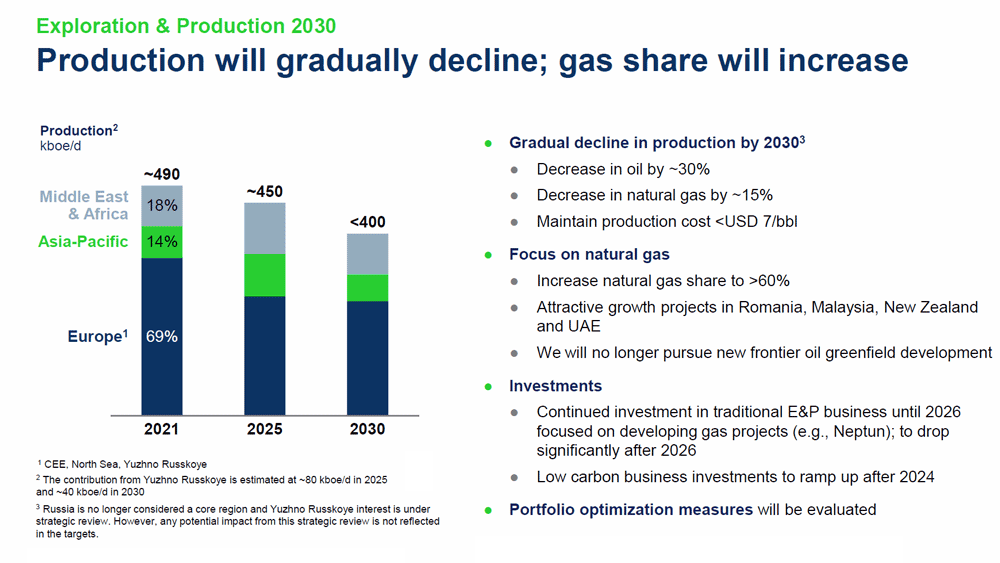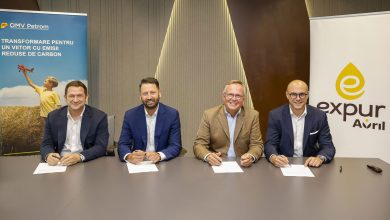OMV’s New 2030 Strategy: Focusing on Circular Economy Solutions
- OMV aims to become a leading, integrated sustainable fuels, chemicals, and materials company with a strong focus on circular economy solutions
- Net-zero (Scope 1, 2 and 3) to be reached by no later than 2050
- Shift towards low-carbon business; stop oil & gas production for energy by 2050
- Focus on European sustainable fuels leadership
- Expansion and diversification of Chemicals & Materials business
- Russia no longer a core region with no future investments pursued
- Clean CCS Operating Result of at least EUR 6 bn by 2030 and Operating Cash Flow of at least EUR 7 bn by 2030
- Mid- to long-term target ROACE at or above 12%
- Progressive dividend policy confirmed
OMV Group has published its new 2030 strategy, which essentially aim at reducing the production and use of fossil oil and gas to produce fuels and electricity, and its new target will be the chemical industry, in parallel with concern on the geothermal energy area, conventional renewables and carbon storage solutions. OMV has also announced in its new strategy that it will carry out investments in the gas sector only until 2026.
“Based on this new strategy representing the most fundamental strategic shift in the company’s history, OMV aims to become a net-zero emissions company by no later than 2050. The business segment Chemicals & Materials will be the growth engine of the company. It is to be substantially strengthened, expanded, and diversified, with the aim to establish a globally leading position in circular economy solutions. The Refining & Marketing business is to become a leading European provider of sustainable fuels, feedstock, and mobility solutions. In line with the ambition to become a net-zero company, OMV will reduce its oil and gas production by around 20% by 2030 and will completely cease oil and gas production by 2050. At the same time Exploration & Production business segment will invest in geothermal energy and carbon capture and storage (CCS) leveraging existing assets and capabilities and contribute to a more sustainable society,” OMV shows.
New strategy to deliver sustainable future addressing global challenges
The fundamental changes related to climate and greenhouse gas reduction targets as well as recent geopolitical developments with the military conflict in Ukraine are significantly impacting the oil and gas industry. In order to ensure long-term sustainable success and the ability to deliver attractive returns for all stakeholders, OMV commits to becoming a net-zero company in Scope 1, 2 and 3 by 2050 at the latest. The plan foresees emission reduction targets of 30% in operations (Scope 1 & 2) and a 20% reduction target in the product portfolio (Scope 3) for 2030. Portfolio upgrades, enhancing efficiency, increasing renewable energy purchases, reducing throughput and sales of fossil refinery products, and increasing the share of recycled and sustainable feedstocks will be the key levers in achieving these targets.
Refocus on chemicals and materials
The Chemicals & Materials business will be further strengthened, expanded, and diversified to become the OMV Group’s key growth driver. Driven by Asian markets, global demand for virgin polyolefins is expected to grow above global GDP by 2030. Polyolefins are the largest market segment in the production of plastic goods and remain essential for various industries such as energy, automotive, packaging, construction, and healthcare. A key success factor for sustainable business models in the medium- to long-term is growth in renewable feedstock, bioplastics, and the development of circular solutions. Demand for recycled polyolefins is expected to grow globally about three times faster than virgin polymers until 2030. OMV’s goal is to become a leading global supplier of polyolefin solutions. Important strategic guidelines include expanding the business in attractive markets, particularly in North America and Asia, as well as building sustainable polyolefin production, representing up to 40%of total polyolefin production in Europe. On top of this, the OMV Group intends to take a leading position in the field of renewable and circular economy solutions. Growth is also set to be achieved by diversifying the portfolio towards adjacent products and new product groups. The company can build on a strong position. As a global, backward-integrated polyolefin producer with a base chemical capacity of 7 million metric tons per year and around 6 million metric tons of polyolefins, the OMV Group is among the top 10 polyolefin producers worldwide. Extensive innovation capabilities with innovation centres in Austria, Sweden, Finland, and Abu Dhabi, as well as 10,000 successfully filed and granted patents are a strong foundation for future success.
OMV intends to achieve integrated growth, both in olefins and polyolefins, building on the strong fundamentals of the chemical market, such as attractive growth rates, exposure to various end-industries and best-in-class returns. A new propane dehydrogenation (PDH) plant coming on stream in Kallo, Belgium, in 2023, will be key to expanding OMV’s monomer position in Europe. Projects such as ReOil will help replace virgin feedstocks with sustainable ones.
OMV’s partnership with Abu Dhabi based Borouge is the main vehicle for meeting growing customer demand in the Middle East and Asia. With a new ethane cracker producing 1.5 mn metric tons of ethylene and two Borstar plants producing 1.4 mn metric tons of polyethylene per year, Borouge will become the world’s largest polyolefin complex at a single site. In North America, expansion will be driven by the Baystar joint venture with TotalEnergies.
Overall, these growth projects will increase sales of monomers by 35% and polyolefins by around 30%.
“Chemicals & Materials will not only be our growth engine but balance sustainability, risk and returns and strengthen our resilience against market dynamics,” said OMV CEO Alfred Stern.
Patented chemical recycling technologies as well as standard and advanced mechanical recycling technologies are expected to support OMV in becoming a global leader in circular economy solutions.
OMV to optimize its refineries
In Refining, OMV strives to become a leading producer of sustainable fuels and chemical feedstock in Europe. Fossil fuel throughput will decline in line with changing demand patterns, while integration with the Chemicals & Materials business segment will be driven forward and deepened.
While the market potential for European fossil refineries will decline significantly in terms of both volumes and margins, renewable fuels, and sustainable chemical feedstock will increase. Accordingly, OMV will optimize its integrated refineries in Schwechat and Burghausen to maximize high-quality fossil resources and raise the share of sustainable feedstock. The three European refineries in Austria, Germany, and Romania will continue to be run as one integrated system, optimizing utilization, and maximizing margins.
Production of sustainable fuels and chemical feedstock will be increased to 1.5 million metric tons per year by 2030, with sustainable aviation fuels accounting for almost half of the volumes.
“In Refining, OMV is turning away from fossil feedstock to become a leading, innovative producer of sustainable fuels and chemical feedstock in Europe. This will drive and deepen the integration with our Chemicals & Materials business,” said Martijn van Koten, Member of the Executive Board responsible for Refining.
In Marketing, OMV will grow profitability and further develop existing market potential through significant growth in the non-fuel business sector. The retail segment will be resilient but increasingly shift from fuel to e-vehicle charging, hydrogen, and convenience. A portfolio of sustainable premium fuels based on biofuels and synthetic fuels will compensate for the decline in fossil fuels. OMV intends to increase the margin contribution of the retail non-fuel business by around 30% by 2030.
OMV is expanding its capabilities to take advantage of the growth in e-vehicle charging, leveraging its strong retail position in Central and Eastern Europe. Investing more than EUR 400 million by 2030, OMV will offer more than 2,000 e-charging points by 2030 at highway and transit route filling stations, plus around 17,000 office wall-box charging points by 2030.
OMV is also aiming to increase sales of Sustainable Aviation Fuel to more than 700,000 metric tons – well beyond the planned regulatory framework – and will target the growing voluntary compliance market.
Reduce fossil and develop sustainable energy solutions
In line with the ongoing energy transition, the Exploration & Production business will support the transformation of the OMV Group as a robust cash generator and focus on further upgrading its competitive asset portfolio. The gradual decline foresees a decrease in crude oil production by around 30% and natural gas production by around 15% by 2030. Investment in the oil and gas production will be continued until 2026, with a focus on developing gas projects, after which it will decrease significantly. The share of gas will increase to more than 60%. The production of oil and gas for energy use will be completely stopped by 2050. As of April 1, 2022, the gas sales and logistics business, excluding OMV Petrom, will be consolidated in E&P to leverage synergies.
At the same time, OMV will invest around EUR 5 billion in the development of low-carbon businesses, i.e., geothermal energy and carbon capture and storage (CCS) to reduce its greenhouse gas emissions. In geothermal energy, OMV sees its advantage in its already extensive experience. Production is expected to reach up to 9 TWh by 2030. OMV is also developing its CCS business to offset absolute emissions. The target for 2030 is to grow to 5 million metric tons stored per year.
OMV will also expand its solar and wind power generation for captive use to at least 1 TWh and explore opportunities in gas and hydrogen storage solutions. In addition to reducing its CO2 footprint, OMV is also working to lower methane emissions. In line with its commitment to the World Bank initiative, routine flaring and venting of associated gas from oil production will be phased out by 2030. In parallel, methane emissions measurement will be improved, as well as advanced methane leak detection.
Ambitious financial targets and progressive dividend policy drive shareholder returns
OMV has had a solid financial track record in recent years and expects its transformation strategy to lead not only to strong sustainability performance, but also to higher profitability and improved earnings quality. The Clean CCS Operating Result is expected to reach at least EUR 6 bn by 2030. Operating Cash Flow (excl. net working capital effects) should reach over EUR 7 bn by that time. Following clear priorities in capital allocation – capex first, followed by dividend, inorganic growth, and deleveraging – investments of EUR 3.5 bn each year are planned to support organic growth. At least 40% has been earmarked for low-carbon projects. In the medium to long term, OMV is targeting a ROACE of 12% or more. The company aims to maintain a strong balance sheet, keeping its leverage ratio below 30% and a strong investment grade rating. OMV will maintain its progressive dividend policy, also reflecting the current geopolitical situation and decision to cease investment in Russia, in order to deliver significant value to shareholders.
“Also from a financial perspective, our OMV Strategy 2030 is a winning strategy in all relevant areas, be it business, sustainability, and our continued focus on attractive returns for shareholders. Our move towards chemicals is the perfect combination to reduce our carbon footprint while remaining a highly profitable growth company with a progressive dividend policy,” OMV CFO Reinhard Florey noted.
Final investment decision in Neptun Deep project, in 2023
OMV will make the final investment decision in the Neptun Deep natural gas project in the Romanian section of the Black Sea next year, pending a new offshore law from the Romanian parliament, Alfred Stern said on March 16.
“The Neptun Deep asset in the Black Sea represents a unique opportunity for Romania and Europe to become less dependent on imports. OMV Petrom will be the operator of the block with Romgaz as a partner. Depending on a new offshore law in Romania, we expect final investment decision to be taken in 2023, with first gas in 2027,” OMV CEO Alfred Stern told a press conference in which he presented the 2030 strategy of the group.
“With an investment of up to 2 billion euro in Neptun Deep, we expect the block plateau production of about 70,000 barrels of oil equivalent per day, net to OMV for an estimated period of about 10 years,” he added.


